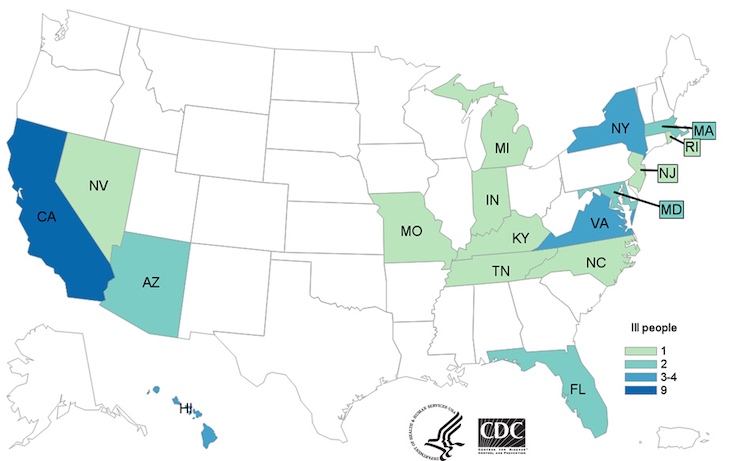The Sun Hong Foods Enoki Listeria outbreak sickens pregnant women and 30 others in 17 states according to the Centers for Disease Control and Prevention (CDC). Four people died. Epidemiologic and laboratory evidence indicates that enoki mushrooms labeled “Product of Korea”are the likely source of this Listeria monocytogenes outbreak.

The patient case count by state is: Arizona (2), California (9), Florida (2), Hawaii (3), Indiana (1), Kentucky (1), Maryland (2), Massachusetts (2), Michigan (1), Missouri (1), Nevada (1), New Jersey (1), New York (4), North Carolina (1), Rhode Island (1), Tennessee (1), and Virginia (3). Illness onset dates range from November 23, 2016 to December 3, 2019. The patient age range is from less than 1 to 97.
Of 32 people who gave information to the investigators, 30 have been hospitalized. Four deaths have been reported from California, Hawaii, and New Jersey. Six cases are in pregnant women; two of the women suffered miscarriage or stillbirth.
The illness onset date range is so large because Listeria monocytogenes can be present for years in a food processing facility. It is very difficult to eradicate this pathogen; it even resists cleansers. Investigators used PulseNet to find people sickened with the particular DNA strain of this pathogen. Whole genome sequencing (WGS) showed that bacteria isolated form ill persons were closely related genetically. That means they are more likely to share a common source of infection.
The Michigan Department of Agriculture and RURal Development collected these mushrooms from a grocery store where a patient bought enoki mushrooms. Two samples of those mushrooms yielded the outbreak strain of Listeria monocytogenes Additional testing is ongoing in California.
On March 9, 2020, Sun Hong Foods recalled their enoki mushrooms labeled as “Product of Korea.” The CDC statement said that people in high risk groups, including pregnant women, the elderly, any0one with a compromised immune system, the young, and those with chronic illnesses should avoid eating all enoki mushrooms that are imported from Korea. If you aren’t sure whether the mushrooms you purchased are from Korea, discard them.
Consumers should discard these mushrooms if they have them, and retailers and restaurants should not sell them. All surfaces that may have come into contact with the mushrooms should be sanitized.

Attorney Fred Pritzker, who has filed many lawsuits on behalf of clients sickened with listeriosis, said, “This type of outbreak should not happen.” If you or a loved one has been diagnosed with food poisoning, you can contact Fred for help by calling 1-888-377-8900 or 612-338-0202.
Symptoms of listeriosis, the illness this pathogen causes, may not appear up to 70 days from the date of infection. If you did eat these mushrooms, watch yourself and family members for these symptoms, which include high fever, severe headache, stiff neck, muscle aches, diarrhea, and nausea.
This Enoki Listeria outbreak sickens pregnant women. Pregnant women experience different symptoms when they contract this infection: they may think they have a mild case of the flu. But as this outbreak shows, these women can suffer stillbirth, miscarriage, and premature labor with listeriosis. If you do get sick contact your doctor. You may be part of this outbreak.




